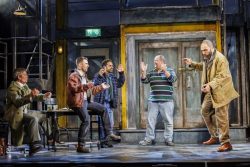 IN many ways the story of Montague Burton, gentlemen’s outfitters, runs parallel with the rise and fall of the steel industry in the UK. Escaping from Russian pogroms, Lithuanian born Meshe David Osinsky arrived in this country in 1900, aged 15 and unable to speak English. Within a year he was earning a living as a peddler of ready-made suits, and within 30 years, his name now changed to Montague M Burton, his had his own clothing factory with more than 400 outlets.
IN many ways the story of Montague Burton, gentlemen’s outfitters, runs parallel with the rise and fall of the steel industry in the UK. Escaping from Russian pogroms, Lithuanian born Meshe David Osinsky arrived in this country in 1900, aged 15 and unable to speak English. Within a year he was earning a living as a peddler of ready-made suits, and within 30 years, his name now changed to Montague M Burton, his had his own clothing factory with more than 400 outlets.
By the early 1990s, the once all powerful steel industry, and main employer in towns like Sheffield were, like the once tremendously popular Burtons menswear shops, overtaken by overseas imports as well as changing tastes, and were about to be consigned to the scrap heap, leaving the huge numbers of people who worked for them struggling to find employment.
It’s against this background that the story of The Full Monty is told, personal relationships exposed to stark examination as everyone from the lowest factory-floor worker to high management line up together to collect their dole money. Desperate situations require desperate solutions, and a suggestion that these six very unlikely candidates, all former steelworks employees, form an act to mirror the Chippendales looked like an answer to their problems.
To do so they have to learn a routine, and get readt to end the act by exposing themselves, completely starkers … The Full Monty.
Which takes us back to Montague Burton, who offered you a two-piece ready-made suit, at a reasonable price, or for a trifle more, one with an added waistcoat, which choice, if you took it, gave you what the company described as ‘The Full Monty’.
Set in the early 1990s, when Sheffield, in common with many industrial towns, was seeing the closure of its biggest long term employers, we meet six men looking at the bleakly frightening prospect of long-term unemployment, after years of comfortable full time work.
The once devil-may-care Gaz, played by Danny Hatchard, is desperate to find £600 back-maintenance money to pay his estranged wife Mandy (Laura Matthews), in order to retain access to his 11-year-old son Nathan (Rowan Poulton). It was no surprise when this spirited youngster provided Gaz with true backbone when he threatened to give up the fight.

Dave, Gaz’s best mate played by Neil Hurst, is sure that his bulky frame is driving a wedge between him and his beloved wife Jean, sympathetically played by Katy Dean. After a failed attempts to steal a steel girder from their old works, Gaz comes up with the crazy idea of emulating The Chippendales strip act in the local working men’s club, and to secure the booking offers the tempting extra of seeing them go “The Full Monty”, revealing all at the end of the act.
First they need someone to teach them a routine, and find such a person in the form of their ex-foreman Gerald (Bill Ward), desperate to save face and not tell his wife Linda (Suzanne Procter) – battling against an inappropriate blonde wig that makes her look more like a factory girl than a social climbing snob – that he has been unemployed for six months.
They are joined by the arthritic, lonely, Horse (Ben Onwukwe), Guy (Jake Quickenden) quite willing to show that he is gay, and the introverted Lomper (Nicholas Prasad), still battling with his own homosexual feelings. They may be an ill-assorted sextet, but the way in which they face and overcome each hurdle put in their way brings a tear to your eye one minute and a smile turning into a loud laugh the next.
These are real people and through this cast – driven along at great pace by director Michael Gyngell, ideally costumed and encased in a very mobile set by designer Jasmine Swan – you see their many weaknesses, share their agonies and frustrations and wish them well for the future.
GRP